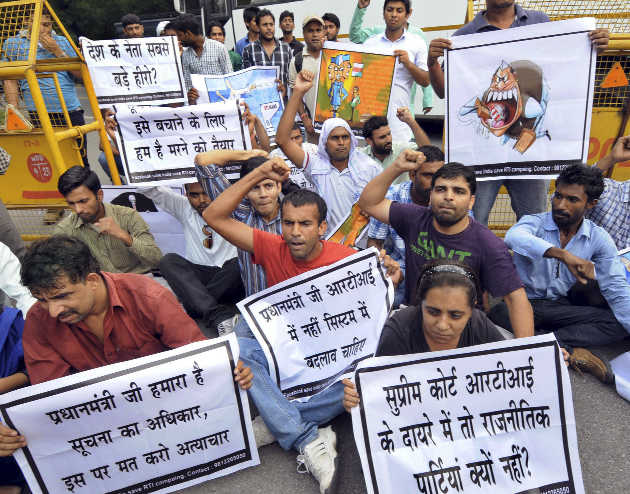
Appointments to the higher judiciary must be in the RTI purview. PTI
Jagdeep S. Chhokar
It has been reported that Law Minister DV Sadananda Gowda has said that the Memorandum of Procedure for the appointment of judges to the higher judiciary is "to be kept out of RTI purview" (March 9, 2016). This statement of intent by the government has many implications. Some of them go beyond the appointment of top judges or even the entire judiciary. Calling attention to the following timeline will be helpful in understanding those implications.
October 29, 2010: The Association for Democratic Reforms (ADR) files RTI applications to six national political parties (the BJP, the BSP, the Congress, the CPI, the CPI-M and the NCP), seeking information about the "Sources of the 10 maximum voluntary contributions received by your party from Financial Year 2004-05 to Financial Year 2009-10."
May 16, 2011: Subhash Chandra Aggarwal files RTI applications to the BJP and the Congress, seeking information about several issues such as (i) "Outline of receipts (separately by cash/online/ cheque) by (them) in the last two years, separately for each year, for which updated account information may be there,” and (ii) Outline of payments (separately by cash/ online/ cheque etc.) made by the BJP in last three years separately for each year for which updated account information maybe there."
Some of the political parties respond, saying they are not public authorities under the RTI Act. Some do not even respond.
March 14, 2011: The ADR files a complaint to the Central Information Commission (CIC) against the response of political parties and requests the CIC to declare the six national political parties to be public authorities under the RTI Act.
September 6, 2011: Subhash Aggarwal files a complaint to the CIC on the same lines and with the same request.
June 3, 2013: The CIC declares six national political parties to be public authorities under RTI, “directing” the "presidents, general/secretaries of these political parties are hereby … to designate CPIOs and the appellate authorities at their headquarters in six weeks' time.” It also requires “the CPIOs so appointed (to) respond to the (original) RTI applications in four weeks’ time, and further "directs … the presidents/general secretaries of the … political parties … to comply with the provisions of Section 4(1) (b) of the RTI Act by way of making voluntary disclosures on the subjects mentioned in the said clause.’ None of the six political parties comply with the CIC’s order.
August-December, 2013: Complaints filed with the CIC for non-compliance of its order of June 3, 2013.
March 16, 2016: The CIC says it is unable to get its order implemented though it is legal and unchallenged. It terms it an “unusual case of wilful noncompliance” and concludes that “in cases such as this, the Commission is bereft of the tools to get its orders complied with.”
May 19, 2015: The ADR and Subhash Aggarwal file a PIL in the Supreme Court requesting implementation of the CIC's decision of June 13, 2013.
August 21, 2015: The Union of India files an affidavit in the Supreme Court petition, saying that the RTI should not be applicable to political parties.
February 27, 2016: The CPI(M) files an affidavit in the Supreme Court petition, saying that the RTI should not be applicable to political parties. Other political parties are yet to respond.
What does the above have to do with keeping appointment of top judges out of purview of the RTI Act? Public memory is not so short as to have already forgotten the acrimonious exchanges witnessed during the hearings on the constitutionality of the National Judicial Appointments Commission (NJAC) Act when the Attorney-General, arguing on behalf of the Central Government, termed the collegium system of appointment of judges to be totally opaque. He had also vigorously argued that all appointments should be transparent and open to scrutiny under the RTI Act.
This u-turn by the government makes one wonder about the possible rationale behind it. The Law Minister's statement, “this MoP will be appreciated by the judiciary," provides a possible clue to underlying intentions.
Is it possible that this is a not-so-disguised message to the judiciary from the government, (read political class) that the judges' appointment process can be kept outside the purview of the RTI Act? The unstated assumption may well be that since one good turn deserves another, political parties should also be kept outside the purview of the RTI Act. To an uninitiated eye, this appears to be an invitation to collude. Will the judiciary bite?
The writer is a former Professor, Dean, and Director In-charge of IIM, Ahmedabad. The views expressed are personal.



























